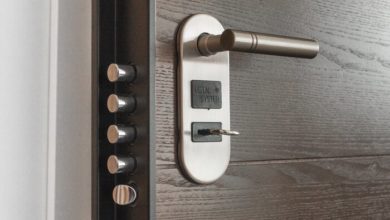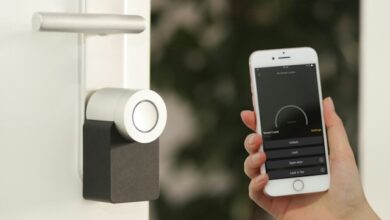The Assistive Tech Improving Home Security For People With Disabilities
KEY TAKEAWAYS
Over 40 million people in the United States have a disability, yet a digital divide exists between those who have a disability and those who don’t. For example, 62% of adults with a disability own a desktop or laptop computer, compared to 81% of those without a disability, Pew Research Center reveals. Assistive technology can drastically improve home security for people with disabilities, so it’s essential this digital divide is closed. With the right assistive tech, people with disabilities can live safely and more independently around the home.
Smart doorbells
Smart doorbells send smartphone alerts whenever someone is sensed coming or going from your home, making them particularly useful for people with vision impairments and/or mobility issues. A built-in speaker can also then be used to have a two-way conversation if necessary. For example, the Arlo essential video doorbell will alert you to people, deliveries, cars, animals, and general movement happening in front of your door — regardless of whether your doorbell is rung or not. A smartphone notification is sent in addition to the regular doorbell sound, while you’re also provided with a clear, full-view picture thanks to the wide-angle lens. You can then either answer your door remotely with your smartphone or smart display or simply take note of who’s there without having to answer.
Smart locks
Smart locks allow you to lock or unlock your door without the need for a physical key — making them a great solution for people with mobility issues, impaired vision, or who simply have difficulty using keys. For example, the Yale smart lock is a flexible, secure option that opens with up to 20 unique passwords. It can also use 20 different key tags, phone tags, and key cards for greater convenience. Smart locks can also deter burglars, however if a break-in does occur, steps should be taken to press charges for theft or assault. Moreover, people with disabilities may also benefit from legal support in other areas of life. Cerebral palsy lawsuits, for example, can help families with children with cerebral palsy win compensation to cover the cost of resulting medical expenses and nessecary home modifications. Cerebral palsy is the most common childhood motor disorder and often caused by medical negligence during the birthing process.
Smart smoke detectors
By sending smartphone alerts to you whether you’re at home or out (or to your caregiver) and by triggering other home smart devices (including lights), smart smoke detectors can drastically improve home safety in the event of a fire. Apps can also be used to turn off these alarms before they sound, which is particularly useful for people unable to physically reach the ceiling. For example, Google Nest Protect is a smoke and carbon monoxide alarm that uses a voice alert when it senses danger. If you don’t use the app to switch the alarm off, a siren sounds shortly after. Up to six contacts can be added to the app, so caregivers, family, and friends will also be alerted. Perfect for Real Estate Home Security!
Assistive home tech is transforming life for people with disabilities. Smart doorbells, locks, and smoke detectors are just some of the latest devices improving convenience and home security.




